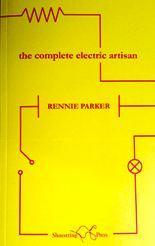Merryn Williams considers books by two poets with vivid imaginations which they use in different ways: Andrew Wynn Owen veers towards mythology while Rennie Parker finds anarchy closer to everyday life.

 The Dragon and the Bomb
The Dragon and the Bomb
by Andrew Wynn Owen
illustrated by Emma Wright
Emma Press, £5
.
the complete electric artisan
by Rennie Parker
Shoestring Press, £8
.
Andrew Wynn Owen is a very young poet who has won both the Newdigate and the Jon Stallworthy Memorial prizes (open only to students at Oxford University). One of these competition-winners, ‘Calm’, impressed me greatly; it shows a remarkable maturity and a gift for rhyming verse. Now he and the excellent Emma Press have produced a thirty-page pamphlet, a single poem in a style reminiscent of Byron.
The reader is likely to be drawn in by his humour and his skilful rhymes, but put off by the poem’s length, for most of us prefer poetry in short bursts; and the story isn’t especially interesting. It’s about an anchorite called Don Armando who is bored with life and seeks ‘adventure, of the dragon-slaying kind’. There is also an alchemist called Haplo who invents death-dealing machines. They find a dragon and they blow it up, but their actions have consequences:
The ocean tantrums at the earth’s disruptions,
And squids rise up to squelch across the waves;
The tides run in with angular eruptions,
Dispatching fishermen to watery graves,
As sharks take beach-huts for their killing caves.
Paused, Haplo beams to see his new Atlantis
And rubs his palms in glee, much like a praying mantis.
Which brings back terrible memories of the Asian tsunami. When we reach the poem’s end we realise that it’s about politicians who roam the world looking for enemies and scientists who help them by manufacturing weapons of mass destruction:
These days, confusing peace with terror, we
Imagine constant trembling for our lives
The best solution to brutality.
Yet still, submerged in all of us, survives
Some precious wish for liberty, which thrives
Most fiercely when it lacks the light. It’s clear
The Bomb must be destroyed, if we’re to conquer fear.
He’s right, of course. The poem ends limply – “we should respect the dragon/And stop our stories short, before they start to drag on” – but still, I should be glad to hear more from this poet.
*
Rennie Parker is a nonconforming zany voice in an increasingly mad twenty-first century world. Her poetry (this is her fifth collection) is often set in a flat Fenland landscape where only the ‘humble mailbox’ is a splash of colour, waiting for someone to post a letter in the old-fashioned way. Elsewhere, ‘the slick laptops fly past’ and life gets ever more frantic– ‘we the undersigned would like to announce’.The first poem, ‘The Sleek Exhibitors’, is about “smooth administrators, briefcases crammed with important work”. The poet compares them to an army of ants. People are “glassy with febrile desire/to get on, get on, get on” (‘So when exactly are you moving on?’) Celebrities feature, too, in ‘My Tabloid Relationship Hell Scenario’, but why are we expected to care about their broken marriages?
because this is how most of us live, the jobs we don’t want, the sales,
the bitching, the second-hand clothes, the paring for cash when the bills
slide in , and I …. I just don’t care
From time to time we hear about interesting, unconventional people, like magicians who perform death-defying stunts or invent crazy machines. But more often it’s a con-man like ‘Mr Dissembler’, who sounds somewhat like Tony Blair:
Mr Dissembler, not the person you were –
in your empire the sun never set
and there the assistants hung at your sides
as barnacles on the skin of a killer whale.
Now we’ve had enough of your awesome reign,
go fall down the complicated ladder of your own esteem
and find as the narrow steps hit you
that no one else is listening – better still
when you have crawled back up
your important friends have moved on.
‘The Difference when you are Single’ takes a wry look at those superwomen who think they can juggle high-powered jobs and families. “They stretch and strain and break themselves in half”, they can never fit in everything
and the glass ceiling is still somewhere beneath their knees
and their heads are spiked with the falling wreckage.
We need more poets with this anarchic imagination.
Merryn Williams considers books by two poets with vivid imaginations which they use in different ways: Andrew Wynn Owen veers towards mythology while Rennie Parker finds anarchy closer to everyday life.
by Andrew Wynn Owen
illustrated by Emma Wright
Emma Press, £5
.
the complete electric artisan
by Rennie Parker
Shoestring Press, £8
.
Andrew Wynn Owen is a very young poet who has won both the Newdigate and the Jon Stallworthy Memorial prizes (open only to students at Oxford University). One of these competition-winners, ‘Calm’, impressed me greatly; it shows a remarkable maturity and a gift for rhyming verse. Now he and the excellent Emma Press have produced a thirty-page pamphlet, a single poem in a style reminiscent of Byron.
The reader is likely to be drawn in by his humour and his skilful rhymes, but put off by the poem’s length, for most of us prefer poetry in short bursts; and the story isn’t especially interesting. It’s about an anchorite called Don Armando who is bored with life and seeks ‘adventure, of the dragon-slaying kind’. There is also an alchemist called Haplo who invents death-dealing machines. They find a dragon and they blow it up, but their actions have consequences:
Which brings back terrible memories of the Asian tsunami. When we reach the poem’s end we realise that it’s about politicians who roam the world looking for enemies and scientists who help them by manufacturing weapons of mass destruction:
He’s right, of course. The poem ends limply – “we should respect the dragon/And stop our stories short, before they start to drag on” – but still, I should be glad to hear more from this poet.
*
Rennie Parker is a nonconforming zany voice in an increasingly mad twenty-first century world. Her poetry (this is her fifth collection) is often set in a flat Fenland landscape where only the ‘humble mailbox’ is a splash of colour, waiting for someone to post a letter in the old-fashioned way. Elsewhere, ‘the slick laptops fly past’ and life gets ever more frantic– ‘we the undersigned would like to announce’.The first poem, ‘The Sleek Exhibitors’, is about “smooth administrators, briefcases crammed with important work”. The poet compares them to an army of ants. People are “glassy with febrile desire/to get on, get on, get on” (‘So when exactly are you moving on?’) Celebrities feature, too, in ‘My Tabloid Relationship Hell Scenario’, but why are we expected to care about their broken marriages?
From time to time we hear about interesting, unconventional people, like magicians who perform death-defying stunts or invent crazy machines. But more often it’s a con-man like ‘Mr Dissembler’, who sounds somewhat like Tony Blair:
‘The Difference when you are Single’ takes a wry look at those superwomen who think they can juggle high-powered jobs and families. “They stretch and strain and break themselves in half”, they can never fit in everything
We need more poets with this anarchic imagination.
By Michael Bartholomew-Biggs • books, poetry reviews, year 2017 0 • Tags: books, Merryn Williams, poetry